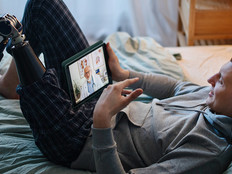Health IT Helps Patients, Researchers Combat Obesity
Currently, more than one third of American adults are considered obese and 71 percent are considered overweight, putting a large portion of the population at increased risk of diabetes, stroke and other health complications.
With obesity proving to be a growing issue, researchers and healthcare providers are employing digital tools and health technology to better monitor predictors of obesity and encourage weight loss.
Mobile Apps Make Weight Loss Possible
Maintaining a healthy weight is an essential part of limiting health risks, but anyone will tell you that it isn’t easy to tip the numbers on the scale. However, digital tools could prove to be another tool in the healthcare provider’s toolbox to help encourage weight loss.
The Journal of Medical Internet Research recently published a study from the University of California, San Francisco, that shows the effectiveness of digital tools in encouraging weight loss through an app designed by health coaching startup Vida Health.
During a trial of the mobile app, 28.6 percent of participants lost an average of 9.5 percent of their body weight and were able to reverse diseases such as high blood pressure and hypertension. Participants in a control group that did not use the digital tools lost just 4 percent of their body weight on average.
“We attribute our success to combining a human touch with evidence-based clinical programs and advanced machine learning technology,” Stephanie Tilenius, Vida Health CEO, tells MobiHealthNews. “This allows us to understand the complexity of chronic disease and what it takes to truly change behaviors.”
The study worked by enrolling participants in a 4-month program, which sent members a package containing a Bluetooth-connected pedometer, wireless scale and blood pressure cuff. After inputting basic health factors, the app connected participants with health professionals like nutritionists, physical therapists and social workers who helped to coach them through weight-loss exercises.
“When participants get the Vida app on their mobile device they first tell us what their health goals are, like ‘lose weight’ or ‘manage diabetes,’” Tilenius told MobiHealthNews. “Then they share their preferences, like coaching style: Some people want a drill sergeant while others want a softer touch. We then match them with an evidenced-based program and a coach who specializes in their goals and aligns with their preferences. The individual selects their coach and they kick things off with a video consultation or phone call. This all happens through our app, available on [Apple's] iTunes or Google Play.”
After the trial, the app had an almost perfect satisfaction rate from users. It could help to move app-based weight-loss coaching to the mainstream.
“Mobile phone app-based health coaching interventions can be an acceptable and effective means to promote weight loss and improve blood pressure management in overweight or obese individuals,” the report concluded. “Given the ubiquity of mobile phones, digital health coaching may be an innovative solution to decreasing barriers of access to much-needed weight management interventions for obesity.”
Tracking Obesity Factors Via Smartphone Data
On a larger scale, data collected by smartphones is helping to combat obesity.
Stanford University’s Mobilize Center recently conducted a study that relied on smartphone data collected from more than 700,000 people in 111 countries to determine physical activity, a factor that can help to predict obesity. The study, published in July, was conducted as part of the National Institutes of Health’s Big Data to Knowledge initiative and relied on a free app for tracking physical activity.
The data could help to prevent the more than 5 million deaths annually caused by inactivity, Health Data Management reports. The report found that the people in the five countries with the greatest level of inequality are nearly 200 percent more likely to be obese than individuals from other countries. Moreover, women are more likely to be inactive and, therefore, more likely to be overweight.
Factors such as living in more “walkable” environments, however, help to cut down on the number of obese individuals.
“This technology that we all have is providing insight into movement around the world and how countries compare,” Grace Peng, director of the National Institute of Biomedical Imaging and Bioengineering program in computational modeling, simulation and analysis, tells Health Data Management. “Relating it to obesity is interesting because it can tell us about our health. But, there’s still a lot remaining to make those correlations exactly.”









